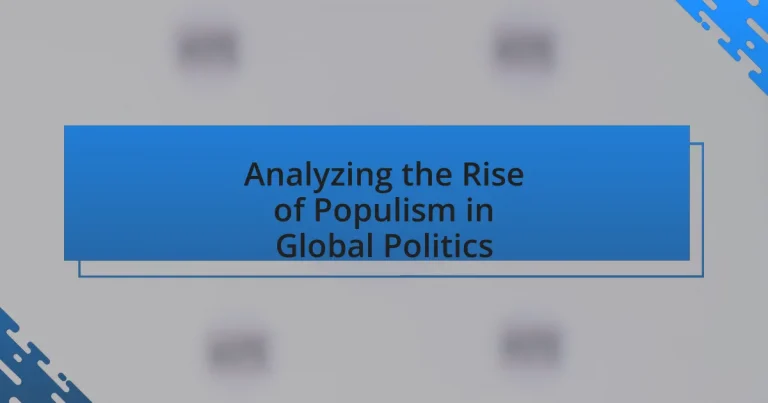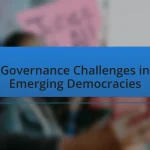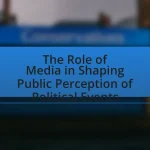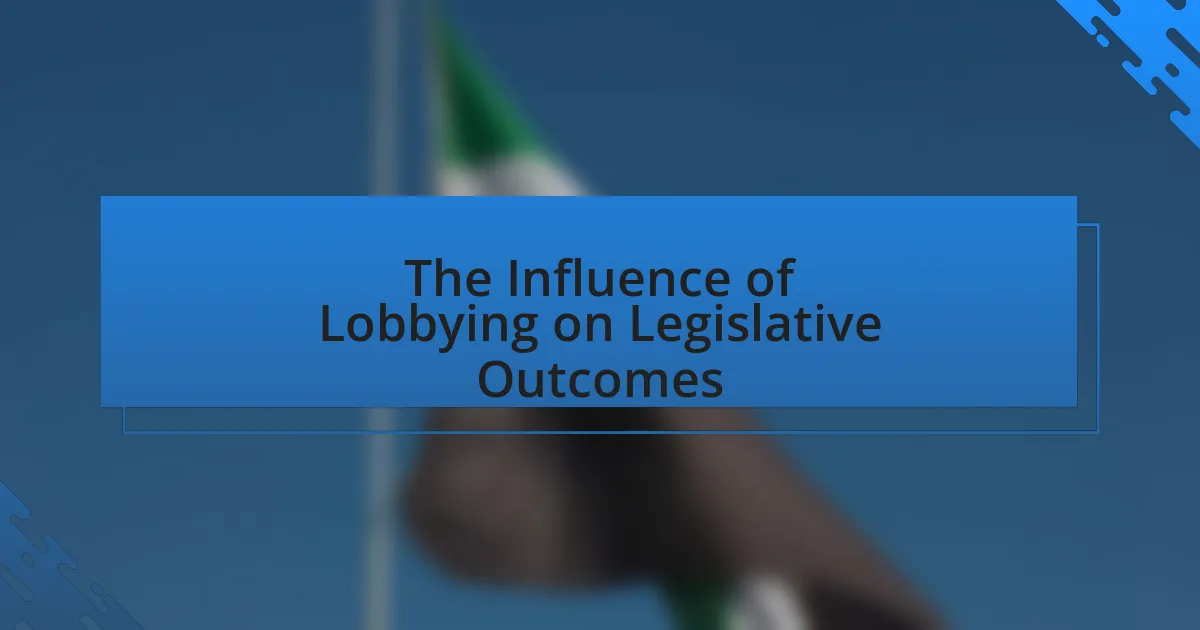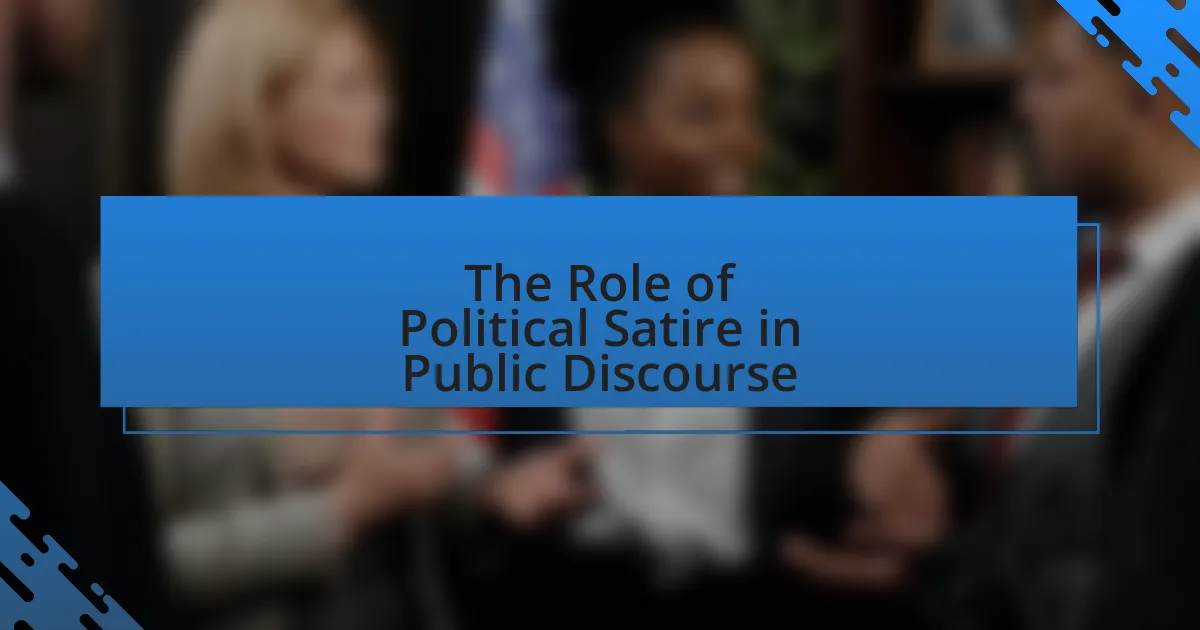Populism in global politics is a political approach that seeks to represent the interests of ordinary people against a perceived elite. This article analyzes the rise of populism, exploring its definition, key characteristics, and the socio-economic factors contributing to its growth. It examines how populism differs from other political ideologies, the role of media in amplifying populist messages, and the impact of populism on democratic institutions and public trust in government. Additionally, the article discusses notable populist leaders worldwide, the challenges populism poses to established political parties, and strategies to address its influence, including promoting civic education and inclusive policies.
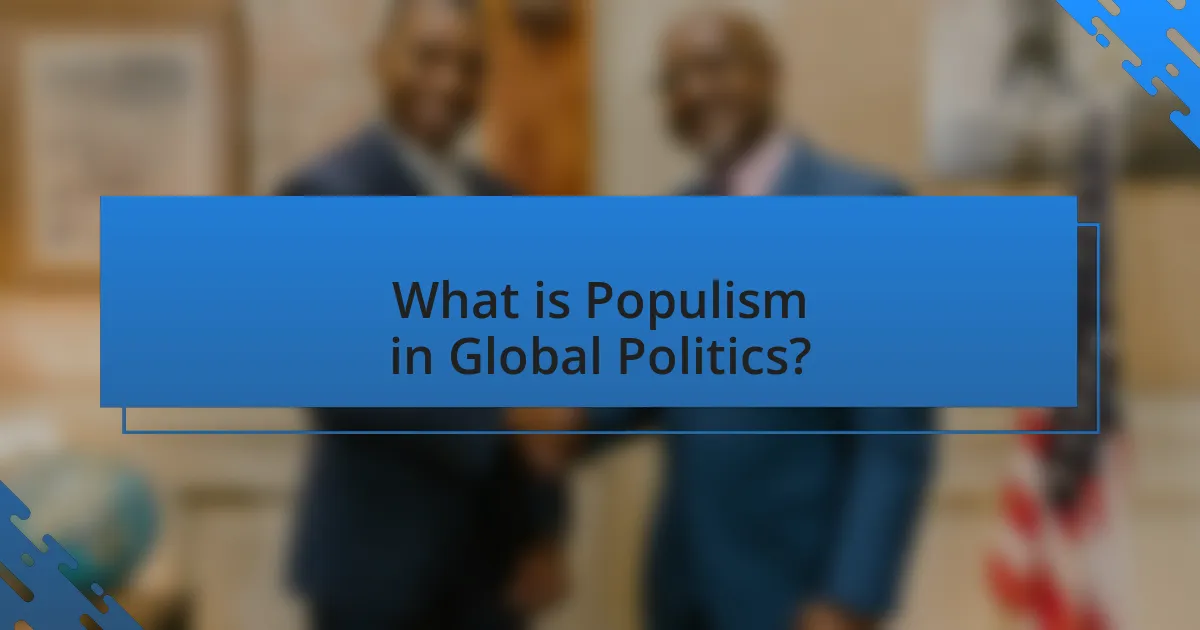
What is Populism in Global Politics?
Populism in global politics is a political approach that seeks to represent the interests and concerns of ordinary people, often contrasting them against a perceived elite or establishment. This phenomenon typically manifests through leaders or movements that claim to speak for the “common people” and advocate for their needs, often utilizing rhetoric that emphasizes division between the elite and the masses. Historical examples include leaders like Hugo Chávez in Venezuela and Donald Trump in the United States, both of whom mobilized support by appealing to popular discontent with established political systems. The rise of populism has been linked to factors such as economic inequality, cultural backlash, and dissatisfaction with traditional political parties, as evidenced by the increasing electoral success of populist parties in various countries over the past two decades.
How is populism defined in the context of global politics?
Populism in the context of global politics is defined as a political approach that seeks to represent the interests and concerns of ordinary people, often contrasting them against a perceived elite or establishment. This definition is supported by the observation that populist movements frequently emerge in response to social, economic, or political grievances, positioning themselves as champions of the common citizen against corrupt or disconnected elites. For instance, the rise of populist leaders in various countries, such as Donald Trump in the United States and Jair Bolsonaro in Brazil, illustrates how populism can mobilize support by appealing to national identity and economic discontent, thereby reshaping political landscapes.
What are the key characteristics of populist movements?
Populist movements are characterized by their appeal to the common people against the elite, emphasizing a dichotomy between “the people” and “the elite.” These movements often utilize charismatic leadership, which fosters a strong emotional connection with supporters. Additionally, populist movements typically advocate for direct democracy and claim to represent the will of the majority, often positioning themselves as the voice of the marginalized or disenfranchised groups. Historical examples include the rise of leaders like Hugo Chávez in Venezuela and Donald Trump in the United States, both of whom mobilized popular support by criticizing established political institutions and elites.
How does populism differ from other political ideologies?
Populism differs from other political ideologies by emphasizing a dichotomy between “the people” and “the elite,” positioning itself as a movement that claims to represent the common citizen against established institutions. Unlike ideologies such as liberalism or conservatism, which often focus on individual rights or tradition, populism prioritizes the collective will of the populace, often advocating for direct action and immediate reforms. This approach is evident in various populist movements worldwide, such as the rise of leaders like Donald Trump in the United States and Jair Bolsonaro in Brazil, who both leveraged anti-establishment sentiments to gain support. These leaders often utilize rhetoric that simplifies complex political issues into binary choices, appealing directly to emotions and national identity, which sets populism apart from more structured political ideologies that rely on comprehensive policy frameworks.
Why has populism gained traction in recent years?
Populism has gained traction in recent years primarily due to widespread discontent with traditional political elites and institutions. This discontent is fueled by economic inequality, perceived corruption, and a sense of alienation among voters, particularly in the wake of the 2008 financial crisis, which exacerbated social and economic divides. For instance, studies indicate that in many Western democracies, there has been a significant increase in support for populist parties, with the Pew Research Center reporting that in 2019, 55% of people in advanced economies felt that the economic system unfairly favors the wealthy. This growing sentiment has allowed populist leaders to position themselves as champions of the “common people” against the establishment, effectively mobilizing support by promising to address these grievances.
What socio-economic factors contribute to the rise of populism?
Economic inequality and social discontent are primary socio-economic factors contributing to the rise of populism. Economic inequality creates a divide between the wealthy and the poor, leading to feelings of disenfranchisement among lower-income groups. For instance, the Gini coefficient, which measures income inequality, has shown increasing disparities in many countries, correlating with a rise in populist movements. Additionally, high unemployment rates and job insecurity, particularly in the wake of globalization and technological change, exacerbate frustrations, prompting individuals to seek out populist leaders who promise to address their grievances. Historical examples include the rise of populist parties in Europe during the 2008 financial crisis, where economic downturns fueled anti-establishment sentiments.
How do political crises influence populist sentiments?
Political crises significantly amplify populist sentiments by creating a sense of disillusionment among the populace towards established political institutions. During crises, such as economic downturns or governmental scandals, citizens often feel neglected and marginalized, leading them to seek alternative political solutions that promise to address their grievances. For instance, the 2008 financial crisis resulted in a surge of populist movements across Europe and the United States, as individuals turned to leaders who positioned themselves as outsiders challenging the status quo. This trend is supported by research from the Pew Research Center, which found that economic instability correlates with increased support for populist parties, as they capitalize on public dissatisfaction and promise to restore power to the “common people.”
What role does media play in the rise of populism?
Media plays a crucial role in the rise of populism by shaping public perception and facilitating the dissemination of populist messages. Through platforms such as social media, populist leaders can directly communicate with their audiences, bypassing traditional media gatekeepers. This direct communication allows for the rapid spread of simplified narratives that resonate with public grievances, often portraying elites as out of touch and the populist leader as a voice for the “common people.”
For instance, during the 2016 U.S. presidential election, Donald Trump effectively utilized Twitter to mobilize support and frame his political narrative, which contributed to his populist appeal. Research indicates that social media platforms amplify populist sentiments by creating echo chambers where like-minded individuals reinforce each other’s beliefs, further entrenching populist ideologies. This phenomenon is supported by studies showing that populist parties in Europe have gained significant traction through social media engagement, highlighting the media’s pivotal role in their rise.
How do social media platforms amplify populist messages?
Social media platforms amplify populist messages by enabling rapid dissemination and engagement with content that resonates emotionally with users. These platforms utilize algorithms that prioritize sensational and polarizing content, which often aligns with populist rhetoric that simplifies complex issues and appeals to the emotions of the masses. For instance, a study by the Oxford Internet Institute found that populist parties in Europe effectively used social media to mobilize support by sharing emotionally charged messages that bypass traditional media gatekeepers. This direct communication fosters a sense of community among supporters, reinforcing their beliefs and increasing the visibility of populist narratives.
What impact does traditional media have on public perception of populism?
Traditional media significantly shapes public perception of populism by framing narratives and influencing discourse. For instance, traditional outlets often highlight populist leaders’ rhetoric, portraying them as champions of the common people against elite establishments, which can enhance their appeal. Research indicates that media coverage can amplify populist sentiments; a study by the Reuters Institute for the Study of Journalism found that populist parties receive disproportionate media attention, which can validate their messages and increase public support. Furthermore, traditional media’s portrayal of populism can either legitimize or delegitimize these movements, depending on the tone and context of the coverage, ultimately affecting how the public perceives their legitimacy and effectiveness in addressing societal issues.
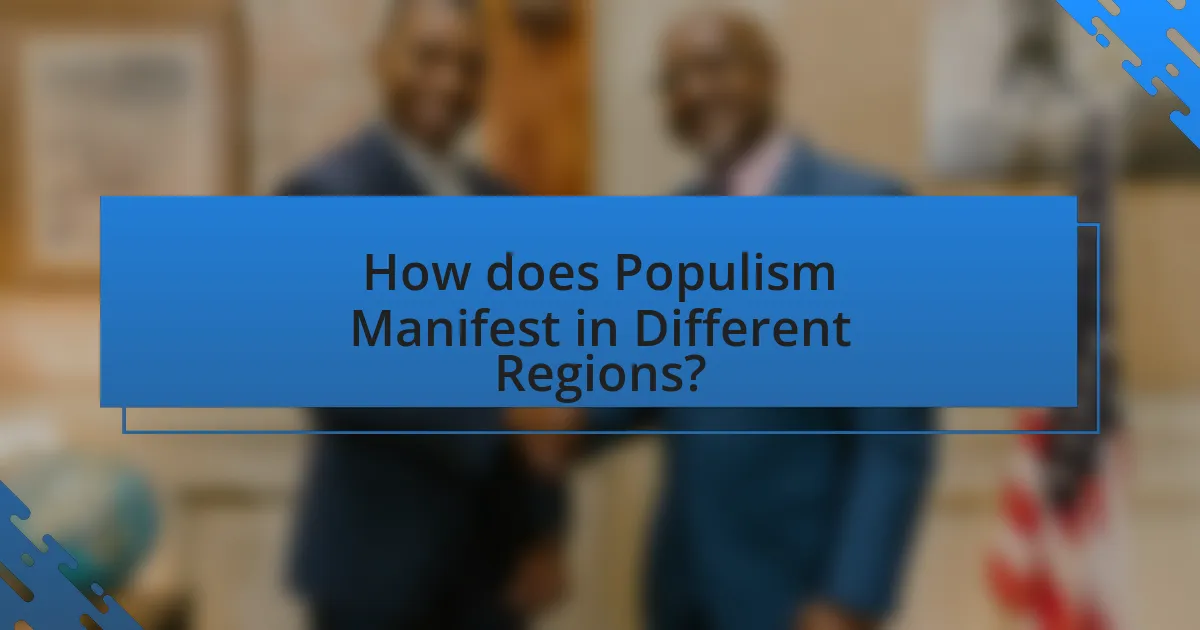
How does Populism Manifest in Different Regions?
Populism manifests differently across regions, often shaped by local political, economic, and cultural contexts. In Latin America, for instance, populism frequently emerges through charismatic leaders who claim to represent the “common people” against a corrupt elite, as seen with figures like Hugo Chávez in Venezuela. In Europe, populism often takes the form of nationalist movements that emphasize anti-immigration sentiments and Euroscepticism, exemplified by parties like the National Rally in France. In the United States, populism has been characterized by a blend of right-wing and left-wing ideologies, with leaders like Donald Trump appealing to disaffected voters through promises to restore national and economic opportunity. Each of these manifestations reflects the unique historical and social dynamics of the respective regions, demonstrating that while the core tenets of populism—such as anti-elitism and a focus on the “people”—remain consistent, their expressions are distinctly influenced by regional factors.
What are the notable examples of populist leaders around the world?
Notable examples of populist leaders around the world include Donald Trump in the United States, Jair Bolsonaro in Brazil, and Viktor Orbán in Hungary. Donald Trump, who served as the 45th President from 2017 to 2021, utilized anti-establishment rhetoric and appealed to nationalist sentiments. Jair Bolsonaro, elected President of Brazil in 2018, gained support through his promises to combat corruption and crime while promoting conservative values. Viktor Orbán, Prime Minister of Hungary since 2010, has implemented policies that emphasize national sovereignty and anti-immigration stances, often positioning himself against the European Union. These leaders exemplify the characteristics of populism by prioritizing the voice of the “common people” against perceived elites.
How do these leaders’ approaches to populism differ?
Leaders’ approaches to populism differ primarily in their methods of engagement with the public and the issues they prioritize. For instance, some leaders utilize direct communication through social media to mobilize grassroots support, while others may rely on traditional media and political rallies to convey their messages. Additionally, the focus of their populist rhetoric varies; certain leaders emphasize economic inequality and social justice, whereas others may concentrate on nationalism and immigration. This divergence is evident in the contrasting strategies of leaders like Bernie Sanders, who advocates for progressive economic reforms, and Donald Trump, who emphasizes national sovereignty and immigration control.
What common themes can be identified among these populist movements?
Common themes identified among populist movements include anti-establishment sentiment, nationalism, and the appeal to the “common people.” Anti-establishment sentiment manifests as a rejection of traditional political elites and institutions, often portraying them as corrupt or out of touch with the populace. Nationalism is evident in the promotion of national identity and sovereignty, frequently accompanied by anti-immigration rhetoric. The appeal to the “common people” emphasizes a direct connection between leaders and their supporters, often through simplified messaging that resonates with widespread grievances. These themes are consistently observed in various populist movements globally, such as the Tea Party in the United States, Brexit in the United Kingdom, and the rise of far-right parties in Europe, all of which leverage these commonalities to mobilize support.
How does populism affect democratic institutions?
Populism undermines democratic institutions by eroding checks and balances, fostering polarization, and promoting authoritarian tendencies. When populist leaders gain power, they often challenge the legitimacy of established institutions, such as the judiciary and the media, which can lead to a concentration of power. For instance, in Hungary, Prime Minister Viktor Orbán has implemented policies that weaken judicial independence and restrict media freedom, demonstrating how populism can disrupt democratic norms. Additionally, populism tends to create an “us versus them” mentality, which exacerbates societal divisions and can lead to the marginalization of opposition voices, further destabilizing democratic frameworks.
What challenges does populism pose to established political parties?
Populism challenges established political parties by undermining their traditional authority and appealing directly to the electorate’s emotions and grievances. This phenomenon often leads to a fragmentation of the political landscape, as populist movements attract disillusioned voters who feel neglected by mainstream parties. For instance, the rise of populist leaders like Donald Trump in the United States and Jair Bolsonaro in Brazil has demonstrated how these figures can capitalize on public dissatisfaction with established political institutions, resulting in significant electoral victories that disrupt the status quo. Additionally, populism can force established parties to adopt more extreme positions or rhetoric to compete for the same voter base, further polarizing the political environment.
How does populism influence public trust in government?
Populism generally decreases public trust in government by fostering a narrative that portrays established political institutions as corrupt and unresponsive to the needs of ordinary citizens. This perception is often amplified by populist leaders who claim to represent the “will of the people” against a so-called elite, leading to a polarization of trust. For example, studies have shown that in countries where populist movements gain traction, such as Hungary and Brazil, there is a marked decline in trust towards traditional political parties and institutions, as citizens feel alienated from the political process. This erosion of trust can result in increased political instability and a challenge to democratic norms, as citizens may become more skeptical of government actions and policies.
What are the potential consequences of rising populism?
Rising populism can lead to increased political polarization and the erosion of democratic norms. Political polarization occurs as populist movements often create an “us versus them” narrative, which can deepen societal divides and reduce compromise among political factions. The erosion of democratic norms is evidenced by populist leaders frequently undermining institutions, such as the judiciary and media, to consolidate power, as seen in countries like Hungary and Turkey. These consequences can destabilize governance and threaten the rule of law, ultimately impacting social cohesion and democratic integrity.
How can populism lead to polarization within societies?
Populism can lead to polarization within societies by creating a stark divide between “the people” and “the elite,” fostering an ‘us versus them’ mentality. This division often manifests in political discourse, where populist leaders exploit societal grievances and amplify existing tensions, resulting in increased hostility between different social groups. For example, research by Cas Mudde and Cristóbal Rovira Kaltwasser highlights that populist movements tend to simplify complex political issues, framing them in binary terms that exacerbate societal divisions. Consequently, this polarization can hinder constructive dialogue and compromise, further entrenching opposing viewpoints within the populace.
What are the implications for international relations?
The implications for international relations due to the rise of populism include increased nationalism, strained multilateral cooperation, and shifts in diplomatic alliances. Nationalist policies often prioritize domestic interests over international commitments, leading to a decline in global cooperation on issues such as climate change and trade. For instance, the United States’ withdrawal from the Paris Agreement under a populist administration exemplifies this trend. Additionally, populist leaders may foster bilateral relationships that undermine traditional alliances, as seen in the changing dynamics between countries like the U.S. and Russia. These shifts can destabilize existing international frameworks and create uncertainty in global governance.

What Strategies Can Be Employed to Address Populism?
To address populism, strategies such as promoting inclusive political dialogue, enhancing civic education, and strengthening democratic institutions can be employed. Inclusive political dialogue involves engaging diverse societal groups to ensure that all voices are heard, thereby reducing the alienation that often fuels populist sentiments. Enhancing civic education equips citizens with critical thinking skills and a better understanding of democratic processes, which can counteract the simplistic narratives often propagated by populist leaders. Strengthening democratic institutions, such as independent media and judiciary, ensures accountability and transparency, which are essential in mitigating the appeal of populism. These strategies are supported by research indicating that societies with robust democratic frameworks and active civic engagement are less susceptible to populist movements.
How can political parties respond to the rise of populism?
Political parties can respond to the rise of populism by adopting inclusive policies that address the concerns of marginalized groups and by enhancing their communication strategies to better connect with the electorate. For instance, parties can implement social and economic reforms that tackle inequality, which is often a key issue exploited by populist movements. Research indicates that in countries like Spain, the rise of Podemos, a populist party, was partly due to traditional parties failing to address economic grievances during the financial crisis. By actively engaging with constituents through town halls and social media, parties can rebuild trust and counter populist narratives.
What strategies can be effective in countering populist narratives?
Effective strategies for countering populist narratives include promoting factual information, fostering inclusive dialogue, and enhancing civic education. Promoting factual information helps to debunk misinformation that often fuels populist sentiments; for instance, studies show that fact-checking initiatives can reduce the spread of false claims by up to 70%. Fostering inclusive dialogue encourages diverse perspectives and reduces polarization, as evidenced by community engagement programs that have successfully bridged divides in various societies. Enhancing civic education equips citizens with critical thinking skills, enabling them to analyze political rhetoric more effectively, which is supported by research indicating that informed voters are less susceptible to populist appeals.
How can engagement with disaffected voters mitigate populist appeal?
Engagement with disaffected voters can mitigate populist appeal by addressing their grievances and fostering a sense of inclusion. When political parties actively listen to and involve these voters in the political process, they can counter the narratives propagated by populist leaders who often exploit feelings of alienation. For instance, research indicates that in the 2016 U.S. presidential election, areas with higher engagement initiatives saw a decrease in support for populist candidates, as voters felt their concerns were being acknowledged and addressed. This demonstrates that meaningful dialogue and policy responsiveness can effectively reduce the allure of populism by creating a more representative political environment.
What role do education and awareness play in combating populism?
Education and awareness play a crucial role in combating populism by fostering critical thinking and informed citizenship. When individuals are educated, they are better equipped to analyze political rhetoric and recognize manipulative tactics often employed by populist leaders. Studies indicate that higher levels of education correlate with lower susceptibility to populist ideologies, as educated citizens tend to prioritize evidence-based decision-making over emotional appeals. For instance, research published in the journal “Political Behavior” demonstrates that individuals with a college education are more likely to engage in political discussions and seek diverse viewpoints, which counteracts the divisive narratives characteristic of populism. Thus, enhancing education and awareness serves as a foundational strategy in mitigating the influence of populist movements.
How can civic education foster critical thinking about populist claims?
Civic education can foster critical thinking about populist claims by equipping individuals with the skills to analyze information, question sources, and understand democratic principles. This education encourages students to engage with diverse perspectives, enabling them to critically assess the validity of populist rhetoric, which often relies on oversimplification and emotional appeal. Research indicates that civic education programs that emphasize critical thinking and media literacy significantly improve students’ ability to discern fact from misinformation, as shown in studies conducted by the Center for Information & Research on Civic Learning and Engagement. These findings demonstrate that informed citizens are better prepared to challenge populist narratives and engage in constructive political discourse.
What initiatives can promote media literacy among the public?
Educational programs in schools can promote media literacy among the public by integrating critical thinking and digital literacy into the curriculum. Research indicates that students who receive media literacy education are better equipped to analyze and evaluate information sources, which is crucial in an era of misinformation. For instance, a study by the National Association for Media Literacy Education found that media literacy programs significantly improve students’ ability to discern credible information from false narratives. Additionally, community workshops and public campaigns can raise awareness about media consumption, encouraging individuals to question the reliability of news sources and understand the impact of media on public opinion, particularly in the context of rising populism.
What best practices can be adopted to strengthen democratic resilience?
To strengthen democratic resilience, best practices include promoting civic education, ensuring media literacy, and fostering inclusive political participation. Civic education equips citizens with knowledge about their rights and responsibilities, which is essential for informed engagement in democratic processes. For instance, studies show that countries with robust civic education programs tend to have higher levels of political participation and trust in democratic institutions. Media literacy helps individuals critically evaluate information, reducing susceptibility to misinformation, a tactic often exploited by populist movements. Furthermore, fostering inclusive political participation ensures that diverse voices are heard, which can mitigate the alienation that populism often capitalizes on. Research indicates that inclusive governance leads to greater stability and resilience in democratic systems, as seen in countries that actively engage marginalized communities in decision-making processes.
How can inclusive policies reduce the appeal of populism?
Inclusive policies can reduce the appeal of populism by addressing social inequalities and fostering a sense of belonging among marginalized groups. When governments implement inclusive policies, such as equitable access to education, healthcare, and economic opportunities, they mitigate the grievances that populist movements often exploit. For instance, research by the International Monetary Fund indicates that countries with higher levels of income equality experience lower levels of populist support. By promoting social cohesion and ensuring that all citizens feel represented and valued, inclusive policies diminish the divisive rhetoric that populists use to rally support.
What role does community engagement play in reinforcing democratic values?
Community engagement plays a crucial role in reinforcing democratic values by fostering active participation and civic responsibility among citizens. When individuals engage with their communities, they develop a sense of ownership and accountability towards democratic processes, which enhances transparency and responsiveness in governance. Research indicates that communities with high levels of engagement tend to exhibit stronger democratic practices, as seen in studies by the National Civic League, which found that engaged citizens are more likely to vote, advocate for their rights, and hold leaders accountable. This active participation not only strengthens democratic institutions but also mitigates the appeal of populism by promoting informed citizenry and collective action.
